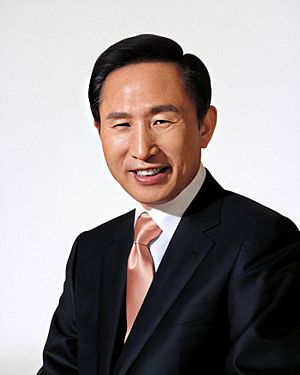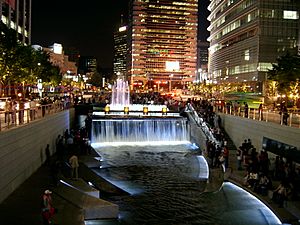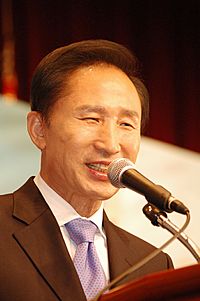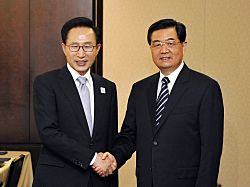Lee Myung-bak facts for kids
Quick facts for kids
Lee Myung-bak
GOM
|
|
|---|---|
|
이명박
|
|

Official portrait, 2008
|
|
| 10th President of South Korea | |
| In office 25 February 2008 – 24 February 2013 |
|
| Prime Minister | Han Seung-soo Chung Un-chan Kim Hwang-sik |
| Preceded by | Roh Moo-hyun |
| Succeeded by | Park Geun-hye |
| Mayor of Seoul | |
| In office 1 July 2002 – 30 June 2006 |
|
| Preceded by | Goh Kun |
| Succeeded by | Oh Se-hoon |
| Member of the National Assembly | |
| In office 30 May 1996 – 21 February 1998 |
|
| Preceded by | Lee Jong-chan |
| Succeeded by | Roh Moo-hyun |
| Constituency | Jongno (Seoul) |
| In office 30 May 1992 – 29 May 1996 |
|
| Constituency | Proportional representation |
| Personal details | |
| Born | 19 December 1941 Osaka, Japan |
| Political party | Independent (2017–present) |
| Other political affiliations |
Saenuri (until 2017) |
| Spouse | |
| Children | 4 |
| Alma mater | Korea University (BBA) |
| Signature | |
| Korean name | |
| Hangul |
이명박
|
| Hanja |
李明博
|
| Revised Romanization | I Myeongbak |
| McCune–Reischauer | I Myŏngbak |
| Art name | |
| Hangul |
일송
|
| Hanja |
一松
|
| Revised Romanization | Ilsong |
| McCune–Reischauer | Ilsong |
Lee Myung-bak (/ˌmjʌŋ ˈbɑːk/; Hangul: 이명박, pronounced [i.mjʌŋ.bak̚]; born 19 December 1941), often referred to by his initials MB, is a South Korean businessman and politician who served as the 10th president of South Korea from 2008 to 2013. Before his presidency, he was the CEO of Hyundai Engineering and Construction, and the mayor of Seoul from 2002 to 2006.
Lee is married to Kim Yoon-ok and has three daughters and one son. His older brother, Lee Sang-deuk, was a South Korean politician. He is a Christian attending Somang Presbyterian Church. Lee is a graduate of Korea University and received an honorary degree from Paris Diderot University in 2011.
Lee altered the South Korean government's approach to North Korea, preferring a more hardline strategy in the wake of increased provocation from the North, though he was supportive of regional dialogue with Russia, China and Japan. Under Lee, South Korea increased its visibility and influence in the global scene, resulting in the hosting of the 2010 G-20 Seoul summit. However, significant controversy remains in Korea regarding high-profile government initiatives which have caused some factions to engage in civil opposition and protest against the incumbent government and President Lee's Saenuri Party (formerly the Grand National Party). The reformist faction within the Saenuri Party was at odds with Lee. He ended his five-year term on 24 February 2013, and was succeeded by Park Geun-hye.
On 22 March 2018, Lee was arrested on charges of bribery, embezzlement, and tax evasion alleged to have occurred during his presidency. Prosecutors accused Lee of receiving bribes totaling 11 billion won and channeling assets of 35 billion won to an illicit slush fund. Shortly before his arrest, Lee posted a handwritten statement on Facebook denying the charges. Lee's arrest occurred roughly a year after the arrest of former president Park Geun-Hye, who was arrested on charges stemming from the 2016 South Korean political scandal. Lee was convicted on 5 October 2018 and sentenced to 15 years in prison. On 29 October 2020, the Korean Supreme Court upheld a 17-year sentence against Lee given to him by an appellate court. On 27 December 2022, President Yoon Suk-yeol granted Lee a special pardon, cancelling the remaining 15 years of the sentence.
Contents
Early life and education
Lee Myung-bak was born 19 December 1941, in Osaka, Japan. His parents had emigrated to Japan in 1929, nineteen years after the Japanese annexation of Korea. Lee's father, Lee Chung-u (이충우; 李忠雨), was employed as a farm labourer in rural Japan, and his mother, Chae Taewon (채태원; 蔡太元), was a housewife. He was the fifth of seven children.
In 1945, after the end of World War II, his family returned to his father's hometown of Pohang, in Gyeongsangbuk-do, which was then an American-occupied portion of the Korean Peninsula. Lee's sister, Lee Ki-sun, believed that they smuggled themselves into the country to avoid having the officials confiscate the property they acquired in Japan. However, their ship was wrecked off the coast of Tsushima island. They lost all their belongings and barely survived. Lee personally witnessed the deaths of his older sister and a younger brother, who were killed in the bombardment of Pohang, during the Korean War.
Lee attended night school at Dongji Commercial High School in Pohang and received a scholarship. A year after graduation, Lee gained admission to Korea University. In 1964, during his third year in college, Lee was elected president of the student council. That year, Lee participated in student demonstrations against President Park Chung-hee's Seoul-Tokyo Talks, taking issue with Japanese restitution for the colonization of the Korean Peninsula. He was charged with plotting insurrection and was sentenced to five years' probation and three years' imprisonment by the Supreme Court of Korea. He served a little under three months of his sentence at the Seodaemun Prison in Seoul.
In his autobiography, Lee wrote that he was discharged from Korea's mandatory military service due to a diagnosis of acute bronchiectasis while at the Nonsan Training Facility.
Business career
In 1965, Lee started work at Hyundai Construction, the company which was awarded Korea's first-ever overseas construction project, a $5.2 million contract to build the Pattani-Narathiwat Highway in Thailand. Shortly after he was hired by the company, Lee was sent to Thailand to participate in the project, which was successfully completed in March 1968. Lee returned to Korea and was subsequently given charge of Hyundai's heavy machinery plant in Seoul.
It was during his three decades with the Hyundai Group that Lee earned the nickname "Raging Bulldozer". On one occasion, he completely dismantled a malfunctioning bulldozer to study its mechanics and figure out how to repair it, only to run it over with another bulldozer that was often operated by Lee himself.
Lee became a company director at the age of 29, five years after he joined the company. He later became the CEO at age 35, becoming Korea's youngest CEO in history. In 1988, he was named chairman of Hyundai Construction at the age of 47.
When he began work at Hyundai in 1965, the company had 90 employees; when he left as chairman 27 years later, it had more than 160,000. Soon after the successful completion of the Pattani-Narathiwat Highway by Hyundai Construction, Korea's construction industry began to focus its efforts on encouraging the creation of new markets in countries such as Vietnam and the Middle East. Following the decline of construction demands from Vietnam in the 1960s, Hyundai Construction turned its focus toward the Middle East. The company continued to be a major player in construction projects with the successful completion of international projects including the Arab Shipbuilding & Repair Yard, the Diplomatic Hotel in Bahrain, and the Jubail Industrial Harbor Projects in Saudi Arabia, also known as "the great history of the 20th century". At that time, the amount of orders received by the Korean construction company exceeded US$10 billion, which contributed to overcoming the national crisis resulting from the oil shock.
Early political career
In 1992, Lee made the transition from business to politics, leaving Hyundai after a 27-year career. He joined the Democratic Liberal Party instead of the Unification National Party, founded by Chung Ju-yung. He was elected as a member of the 14th Korean National Assembly (for Proportional representation). Upon his election, he stated that he ran for the office because "after watching Mikhail Gorbachev change the world, I wanted to see if I could do the same." In 1995, he ran for the city of Seoul's mayoral election, but lost to former prime minister Chung Won-sik during the primary of the Democratic Liberal Party.
In 1996, Lee was reelected as a member of the Korean National Assembly, representing Jongno-gu in Seoul. One of his opponents was future president Roh Moo-hyun, who ranked third place.
In 1999, Lee was a visiting scholar at the George Washington University, in Washington, DC.
Into his second-term, his former secretary Kim Yoo-chan disclosed that Lee had spent excessively in his election campaign, often at the expense of taxpayers outside of his district. After receiving US$18,000 from Lee, Kim wrote a letter reversing his disclosure and fled to Tajikistan. Lee resigned in 1998 before being fined US$6.5 million for breaking election law and forcing Kim to flee. In the by-election held after his resignation, Roh Moo-hyun was elected as his successor.
Mayor of Seoul

In 2002, Lee ran for mayor of Seoul and won. As the Mayor of Seoul, some of Lee's projects included the restoration of the Cheonggyecheon stream, the creation of Seoul Forest, the opening of Seoul Forest Park, the construction of a grassy field in front of Seoul City Hall, and the addition of rapid transit buses to the city's transportation system. His administration transformed the area around Seoul City Hall from a concrete traffic circle to a public lawn for gatherings.
The Live Music Camp incident occurred in 2005, during his reign. Lee suggested that Hongdae concerts be regulated by authorities, which prompted political rivals to compare Lee to former dictator Park Chung Hee. Minister of Culture Yu In-chon convinced him not to do so.
2007 presidential election
On 10 May 2007, Lee officially declared his intention to seek the nomination of the Grand National Party (GNP) as its presidential candidate. On 20 August 2007, he defeated Park Geun-hye in the GNP's primary to become the party's nominee for the 2007 presidential election. During the primary, Lee was accused of profiting from illegal speculation on land owned in Dogok-dong, an expensive neighborhood in Seoul. However, in August 2007, the prosecutors said in the interim announcement, "We do suspect Lee's brother's claim over the land in Dogok-dong, but have failed to verify the real owner of the asset." On 28 September 2007, the prosecutory authority officially dropped the suspicion that the Dogok land was under a borrowed name, announcing, "We have done all necessary investigations, including tracing the proceeds from the sale of the land and call history, and now got to the bottom of this case." In December 2007, a few days before the presidential election, Lee announced that he would donate all of his assets to society.
Lee's stated goals were expressed in the "747 Plan" and included: 7% annual growth in gross domestic product (GDP), US$40,000 per capita, and transforming Korea into the world's seventh largest economy. An important part of his platform was the Grand Korean Waterway (한반도 대운하) project from Busan to Seoul, which he believed would lead to an economic revival. His political opponents criticized the project, saying it was unrealistic and too costly to be realized. Others were concerned about possible negative environmental impact.
Signaling a departure from his previous views on North Korea, Lee announced a plan to "engage" North Korea through investment. He promised to form a consultative body with the North to discuss furthering economic ties. The body would have subcommittees on the economy, education, finance, infrastructure and welfare, and a cooperation fund of $40 billion. He promised to seek a Korean Economic Community agreement to establish the legal and systemic framework for any projects emerging from the negotiations, and called for the formation of an aid office in North Korea as a way of decoupling humanitarian aid from nuclear talks.
His foreign policy initiative was called MB Doctrine, which advocates "engaging" North Korea and strengthening the US-Korean alliance.
Presidency (2008–13)
President Lee embraced an aggressive approach to foreign policy, driving initiatives such as Green Korea and Global Korea. He conducted frequent state visits to other countries and extended invitations to foreign counterparts to visit Korea from the time he took office. In 2009 alone, Lee visited 14 countries, including the U.S. and Thailand on 11 occasions and attended 38 summits.
As a result of his efforts, the decision to hold the G-20 Summit in Seoul in November 2010 was passed unanimously at the 2009 Pittsburgh summit. In a historic first, South Korea became the first non-G8 country to take the chairmanship of the forum, and in Toronto, President Lee rallied support for his proposal on creating global financial safety nets and addressing development issues. At the G-20 Summit in Seoul, this led directly to the unanimous endorsement of the Seoul Development Consensus.
Under his administration, South Korea was admitted to the Development Assistance Committee (DAC). Representatives of the DAC member nations met at the Organisation for Economic Co-operation and Development (OECD) Secretariat in Paris, France, in November 2009, and voted unanimously to admit South Korea as the 24th member. The DAC members provide more than 90 percent of the world's aid for impoverished developing nations, and South Korea is the only member nation that has gone from being an aid beneficiary to a donor.
President Lee's diplomatic efforts led to an agreement between Korea Electric Power Corporation (KEPCO) and the UAE on the construction of a US$20 billion Korean standard nuclear power plant during his visit to the UAE at the end of 2009.
Lee also held bilateral summits with the leaders of the United States, Japan, and People's Republic of China to discuss North Korean affairs. In the wake of the ROKS Cheonan sinking, a joint declaration was issued by the G-8 leaders condemning the North. President Lee succeeded in bringing the Cheonan incident to the forefront in the Chair's Statement for the Asia-Europe Meeting in 2010 at Brussels, drawing member nation support for the South Korean government's stance on North Korea's nuclear issue and stability in Northeast Asia. In addition, President Lee urged Japanese Prime Minister Kan Naoto to put his words on 15 August, Korea's Liberation Day into action. Regular reunions of the families separated by the Korean War drew attention as an international issue after being included in the Chair's Statement.
Under the Lee administration, South Korea successfully concluded a free trade agreement with the European Union on 1 July 2011.
He ended his five-year term on 24 February 2013, and was succeeded by Park Geun-hye.
Awards and honors
National honours
 South Korea (2013)
South Korea (2013)
Foreign honours
 Peru (2008)
Peru (2008)
 Kazakhstan (2009)
Kazakhstan (2009)
 Italy (2009)
Italy (2009)
 Knight Grand Cross of the Order of Merit of the Italian Republic
Knight Grand Cross of the Order of Merit of the Italian Republic
 United Arab Emirates (2011)
United Arab Emirates (2011)
 Denmark (2011)
Denmark (2011)
 Recipient of the Order of the Elephant
Recipient of the Order of the Elephant
 Sweden (2012)
Sweden (2012)
 Knight of the Royal Order of the Seraphim
Knight of the Royal Order of the Seraphim
 Indonesia (2012)
Indonesia (2012)
Electoral history
| Party | Candidate | Votes | % | |
|---|---|---|---|---|
| New Korea | Lee Myung-bak | 40,230 | 41.0 | |
| National Congress | Lee Jong-chan | 32,918 | 33.5 | |
| Democratic | Roh Mu-hyun | 17,330 | 17.6 | |
| ULD | Kim Eul-dong | 6,602 | 6.7 | |
| Total votes | 99,365 | 100.0 | ||
| New Korea hold | ||||
| Party | Candidate | Votes | % | |
|---|---|---|---|---|
| Grand National | Lee Myung-bak | 1,819,057 | 52.2 | |
| Democratic | Kim Min-seok | 1,496,754 | 43.0 | |
| Democratic Labor | Lee Mun-ok | 87,965 | 2.5 | |
| Total votes | 3,510,898 | 100.0 | ||
| Grand National gain from Democratic | ||||
| Party | Candidate | Votes | % | |
|---|---|---|---|---|
| Grand National | Lee Myung-bak | 11,492,389 | 48.7 | |
| Grand Unified Democratic New | Chung Dong-young | 6,174,681 | 26.1 | |
| Independent | Lee Hoi-chang | 3,559,963 | 15.1 | |
| Creative Korea | Moon Kook-hyun | 1,375,498 | 5.8 | |
| Democratic Labor | Kwon Young-ghil | 712,121 | 3.0 | |
| Total votes | 23,732,854 | 100.0 | ||
See also
 In Spanish: Lee Myung-bak para niños
In Spanish: Lee Myung-bak para niños
- Lee Myung-bak rat poster incident



